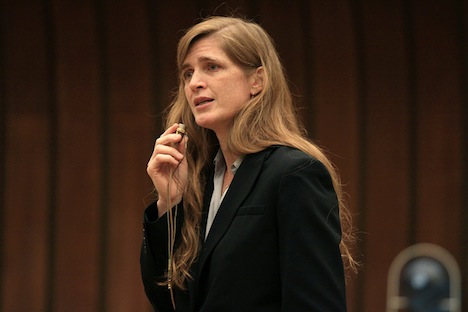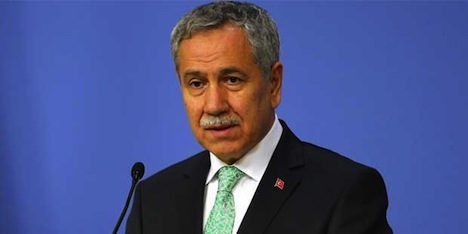U.S. president Barack Obama will shake up his national security team today with the announcement that national security adviser Tom Donilon will be stepping down. In his place will come Susan Rice, the current U.S. ambassador to the United Nations, and in Rice’s place will come Samantha Power as the new UN ambassador (so long as Power is confirmed by the U.S. Senate). ![]()
That will place Rice and Power at the vanguard of the administration’s foreign policy for the next three and a half years, and it will anoint both of them as potential U.S. secretaries of state in future Democratic presidential administrations — Rice was considered a frontrunner to succeed Hillary Clinton as secretary of state earlier this year, though she ultimately lost out to former U.S. senator John Kerry after Senate Republicans made clear that they would hold up Rice’s nomination over her role in the administration’s handling of the attack on U.S. diplomats in Benghazi.
Both women share a perspective that the United States has a role to play to boost human rights around the world, including through the use of military force. Rice, who served in the administration of U.S. president Bill Clinton, ultimately as assistant secretary for African affairs, has often said that U.S. failure to intervene in Rwanda during the 1994 genocide and the Hutu massacre of 800,000 Tutsis was a defining moment. Power (pictured above), a former journalist who covered the fighting in the Balkans and the ‘ethnic cleansing’ of Bosnia-Herzegovina in the early 1990s, has been even more outspoken on the role of U.S. policymaking and its impact on human rights. Before joining the Obama administration as the senior director for multilateral affairs and human rights, Power won a Pulitzer Prize for her 2002 book, ‘A Problem from Hell’: America and the Age of Genocide, which takes the U.S. government and others to task for standing by as genocide occurred in Armenia, Cambodia and Rwanda.
As such, Libya plays a central role in the careers of both officials who, along with Hillary Clinton, were among the proponents arguing for the Obama administration to take an active role in Libya to assist rebels trying to overthrow longtime strongman Muammar Gaddafi. That placed them at contretemps with more traditional foreign policy realists like Donilon and Bob Gates, the U.S. defense secretary at the time. Their success led to a NATO-backed no-fly-zone in Libya and, later, the arming of anti-Gaddafi rebels by NATO allies. The NATO efforts accomplished the goal, and Gaddafi lost control of Libya in August 2011 and he was executed by rebels in October 2011.
In the tradition of U.S. foreign policy, party labels like Democrat and Republican often matter less than where officials fall on the line between liberals and realists (as the terms are commonly understood in international relations theory). So as Donilon leaves the White House and Rice and Power ascend, the big story today is less about any one individual than the shift of the Obama administration much further toward the liberal IR perspective.
Though Senate Republicans will not have the opportunity to question Rice because her role doesn’t require Senate confirmation, they will have an opportunity to question Power and will almost certainly bring the discussion back to Benghazi. But Benghazi’s relevance as a ‘scandal’ is somewhat dubious, especially when there are at least two more important fundamental issues about the administration’s approach to Libya.
The first has to do with U.S. constitutionality and the separation of powers. Whereas the Bush administration sought a vote in the U.S. Congress authorizing its military action in Iraq back in 2002, the Obama administration controversially argued that its military engagement in Libya, at a cost of over $1 billion, never reached the level required to notify the U.S. legislature and seek congressional approval under the Vietnam-era War Powers Resolution. Critics claim that the law required the Obama administration to obtain authorization to continue the Libya operation within 60 days of its inception.
More significantly for world politics, however, are the adverse, unintended consequences of arming the anti-Gaddafi rebels. Some of those arms ended up in the hands of Libyan jihadists, and many more ended up in the hands of all sorts of rebels in northern Mail, including jihadists, Islamists and Tuareg separatists, triggering a crisis that toppled Mali’s government and required French military intervention to stabilize the country. There’s a strong argument that U.S. military intervention in Libya in 2011 prioritized the short-term political rights of anti-Gaddafi rebels at the expense of the human rights of northern Malians and, potentially, the human rights of everyone within the African Sahel, which remains a precarious new security challenge.
These questions are especially relevant in light of the ongoing two-year civil war in Syria. Continue reading Rice and Power bring liberal interventionism back to the heart of U.S. foreign policy


